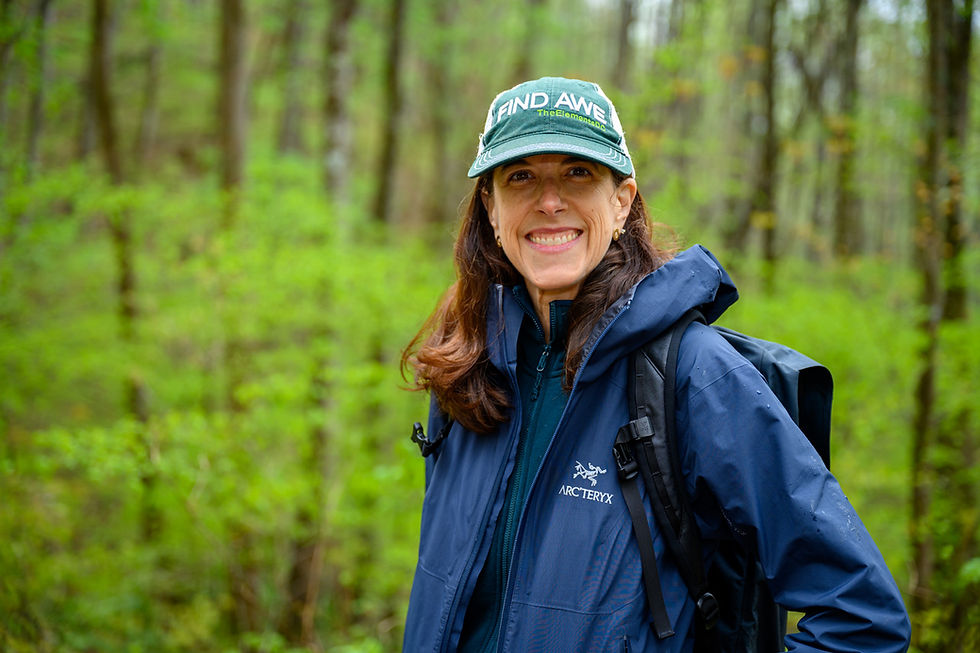Utilizing the Restorative Benefits of Nature for Self Reflection
- hikingresearch
- Feb 22, 2012
- 3 min read
Socrates exhorted us on the virtues of self reflection declaring “that the unexamined life is not worth living.” Unfortunately, the continuing cascade of noise, distractions and information experienced on a daily basis has eliminated many of the opportunities for self examination and reflection.

Mountain Ash (Sorbus americana (Rosaceae)) near Tennent Mountain on the Mountains to Sea Trail, North Carolina (USA) Photo by Mark Ellison
Engaging in self reflection can have numerous beneficial outcomes for personal andleadership development, and nature offers an ideal setting to experience reflection free of the distractions of the modern world. Nature provides an environment that allows attention capacities to rest, offers privacy, helps to reduce stress, and includes soft fascination (things that are of capture attention such as birds, waterfalls, sunsets) that leave room for reflective thought. Privacy is the temporary withdrawal from general society through physical or psychological means (Westin, 1967). The privacy available in nature provides a unique setting to utilize self reflection. It is through this withdrawal from everyday settings that one is better able to reflect and make evaluations about work and life situations.
Self reflection has been described as involving “active, persistent, and careful consideration” (Dewey, 1933, p.9). Boud et al (1985) describes it as “those activities individuals engage in to explore experiences” (p.19). Mezirow described reflection “as the process of critically assessing” (1991, p.104). Reflection translates experience into learning (Seibert & Daudelin, 1999). The functions of reflective thought seem to be closely associated with the releasing of psychological stress and integrating one’s thoughts and experiences (Hammitt & Brown, 1984). With the many distractions experienced in modern life, limited time is available for reflection, self awareness and integration (Hammitt & Brown, 1984).
Being in a restorative natural environment that is away from normal everyday settings provides an opportunity to look at life in a different context, and possibly make connections between concepts that could not be made before. “A deeply restorative experience is likely to include reflections on one’s life, on one’s priorities, and possibilities, on one’s actions and one’s goals” (Kaplan & Kaplan, 1989, p. 197).
The restorative benefits of nature make it an ideal environment for utilizing self reflection for personal and leadership development and should be utilized more fully in higher education settings, and by human resource development professionals.
As an introduction to experiencing the benefits of self reflection while in nature, spend at least 30 minutes in a natural setting that is free of distractions. Utilize all of your senses to experience the various aspects of the environment around you. After at least 30 minutes, reflect on what that experience was like. What did you notice? How did it contrast with the settings you are typically in each day? Make it a priority to set aside time in your schedule on a regularly basis to be in nature. Begin to utilize this time to focus on an area of your life and begin to reflect. Bring along a journal to jot down your thoughts.
Boud, D., Keogh, R. & Walker, D. (1985). Promoting reflection in learning: A model. In D. Boud, R. Cohen, & D. Walker (Eds.), Using experience for learning (pp. 73-86). Bristol, PA: The Society for Research into Higher Education and Open University Press.
Dewey, J. (1933). How we think. Boston, MA: D.C. Heath.
Hammitt, W., & Brown, G. (1984). Functions of privacy in wilderness environments. Leisure Sciences, 6(2), 151-166.
Kaplan, R., & Kaplan, S. (1989). The experience of nature: A psychological perspective. New York: Cambridge University Press.
Keogh, & D. Walker, Reflection: Turning experience into learning (pp. 18-40). London: Kogan Page.
Mezirow, J. ( 1991). Transformative dimensions of adult learning. San Francisco: Jossey-Bass.
Seibert, K. & Daudelin, M. (1999). The role of reflection in managerial learning: Theory, research and practice. Westport, CT: Quorum
Westin, A. (1967). Privacy and freedom. New York: Antheneum.








Comments